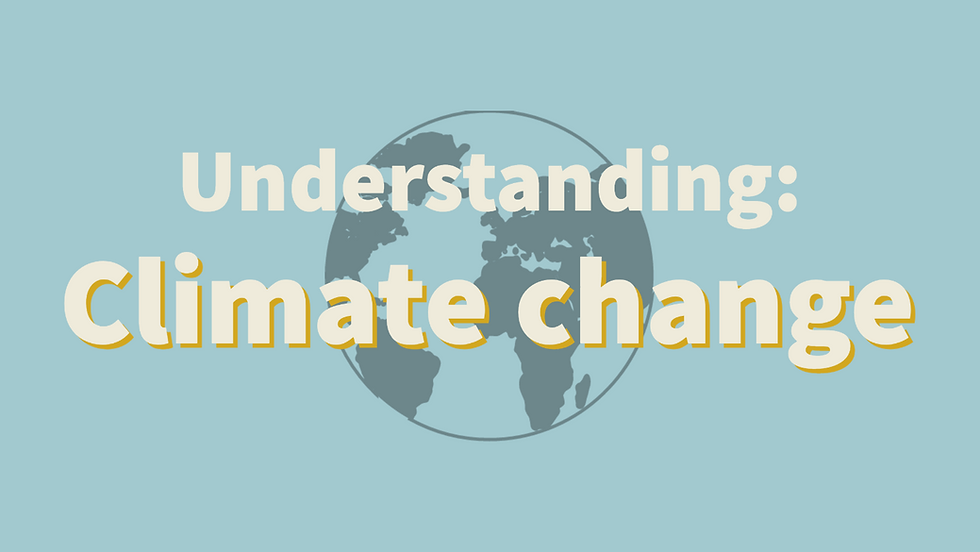Greenwashing - Some Businesses Are Not As Green As You Thought
- Lucinda Turquand-Young
- Nov 29, 2021
- 3 min read
Updated: Dec 10, 2021
The climate crisis is one of, if not the most important, issue of our generation but big businesses and corporations often look the other way in the name of convenience.

Due to a combination of an increase of environmental disasters (floods, fires, landslides etc) and more public awareness of the climate crisis, more and more consumers are now expecting businesses to be more environmentally friendly. As a result of people demanding businesses be more sustainable, we are increasingly seeing businesses falsely and deceitfully advertise themselves and their products as “green” – this is greenwashing.
Edinburgh University lecturer Matthew Brander, who specialises in business, climate change and sustainability describes greenwashing as when companies "make claims to being low carbon or sustainable or green in some way when the reality is something different”. Examples of businesses that have been known to greenwash are Nestle, Ikea, Evian, H&M and many more. These brands have repeatedly advertised their products as “sustainable” when they really have a negative impact on the environment.
“Normally when companies make claims to being low carbon or sustainable or green in some way when the reality is something different”
Consumers are now starting to fight against these brands as they are realising the devastating impacts of climate change. Brander states: “Lots of consumers certainly want to use their spending power and their consumer choice to drive sustainable behaviour. And if that action is diverted, or it's not impactful because of greenwashing then that has that has an impact on the environment”.
Audio clip of Matthew Brander discussing greenwashing
One of many classic examples of a company that has been known to be guilty of Greenwashing is fossil fuel giant BP. They publicly announced that they were going to add solar panels to their gas stations to be more environmentally friendly. In 2019, after BP did not follow through with their promise, environmental group Client Earth lodged a formal complaint against the company. BP mislead the public after they claimed that they were focusing on lowering their carbon emissions when in reality, they spend over 96% of their annual spend on oil and gas.

Another example of businesses who have been known to repeatedly greenwash are fast fashion companies ZARA and H&M. Both companies have a bad habit of labelling several of their clothing collections as “green” or “conscious”, despite their mass-produced clothes still being made from mostly unsustainable materials, such as polyester. According to Edie Newsroom, after a study of the 12 largest British and European fashion brands, it was found that 60% of sustainability claims that are made by 12 titan fashion brands are guilty of greenwashing.
According to Nielson’s Global Sustainability Report, approximately 66% of consumers have said that they would spend more money on a product that comes from a sustainable brand. That figure rises to 73% among the younger generations. This statistic proves that people are willing to pay more money for products that have less of an impact on our environment. When discussing greenwashing, Brander states: “businesses often will find the path of least cost and turn a blind eye to the lack of real environmental integrity if they can…I think it is easy to ignore the warning signs, the alarm bells”. He continues: “I think people constantly find you loopholes in how they present themselves, so they can look good.”
Audio clip of Matthew Brander discussing the trend of sustainability
When discussing how important is to bring awareness to greenwashing, Brander says “I'm aware and colleagues are very aware that we need to implement actions that actually reduce emissions to the atmosphere.” He continued: “Personally, I think what's needed is some regulation in this area where governments say, look what we really want is company and consumer action to drive real reductions in emissions. And therefore, we're going to require businesses provide real evidence, so consumers know what they are getting.”
There are businesses that are genuinely taking steps towards sustainability, such as Stella McCartney’s fashion brand. McCartney often talks about how unsustainable the fashion industry is (with approximately 92 million tonnes of textile waste produced annually) and she is trying to change this. Her brand is fur free, they are working to reduce metal consumptions, they use organic cotton, recycled nylon and polyester, vegetarian leather, paper packaging, and more.
Though we are seeing more businesses genuinely take the steps to become more environmentally friendly, it is currently not enough. Activists are pushing these businesses to be more transparent and sustainable before it is too late.






Comments